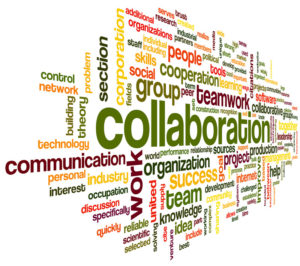Skills and capacities that support collective action

(c) Can Stock Photo / olechowski
1. Develop experts and expertise in social processes
Multi-stakeholder and participatory programs need people who understand the social processes that surround collaboration and engagement. This requires more than just having great communication skills – it is more about being able to assist others with their communication and to work through the conflict and road blocks that can occur when different stakeholders come together. People with expertise in social processes can work with technical experts to help plan and adapt engagement processes and to design programs that meet the needs of the setting and the stakeholders. This holds true for both horizontal engagement (agencies to agencies) as well as vertical engagement (agencies to publics). Cross-sector partnerships and other collaborations need access not only to technical experts, but also to experts with complementary skills in the management of participation and conflict, and the integration of biophysical, technical and social aspects of complex change initiatives.
Having access to a pool of people with social process skills (e.g., facilitation, systemic design, multi-stakeholder process management) is important to help groups and cross-sector partnerships develop robust collaborative processes (particularly in the early stages of coming together), to work through any conflicts that might arise, and to keep processes “on track”. Just as with technical expertise, these people do not need to be present all the time, but they should be available to help with process design an d to ensure that those running collaborative initiatives have adequate social process skills. If social process expertise is missing, initiatives often tend to default to “the usual group “of participants, and the desired creativity and innovation required for the development of improved solution pathways can suffer.
2. Build teamwork and collaboration
Cross-sector partnerships and other collaborations require people to build on a number of skills and capacities that do not always exist in the sector or community involved, or even in the organisations running the initiative. Some people may not have worked in participatory processes before, and collaborative skillsets do take time and practice to develop. However, the outcomes of participatory processes that are done well do justify the learning required.
Many initiatives in the natural resource management, agriculture and public health sectors require people to work in groups, mixed community and organisational teams, communities of practice, and different kinds of partnerships. Collaborative approaches are important because innovation is more likely to emerge from inclusive processes where different actors can share different ideas and perspectives on the problem. However for a group of people to work well together and develop creative solutions, they need time to work together and get to know each other and their respective knowledge bases and cultures. Accordingly, an understanding of how to initiate and foster team and other collective processes is important for delivering constructive participation from those involved. Experts in designing and facilitating social processes can assist by helping people to learn how to work most effectively as part of a team or partnership. While this kind of work comes naturally for some, others may have to learn how to do it.
3. Acknowledge and address institutional barriers
In many complex problem settings (natural resource management, public health, poverty, etc.) there is a growing appreciation that the more immediate barriers are organisational and institutional rather than technical. These barriers can include a tendency to discount non-scientific forms of knowledge, institutional cultures within research and policy making that work against genuinely participatory approaches, and a failure to provide the range of social processes that build shared understandings among diverse stakeholder groups. Performance management and funding structures can often favor those who appear certain – with funders or proponents inclined to back projects that claim to have certain outcomes, rather than those who acknowledge they are trying to learn their way through a complex decision making environment. High staff turnover often works against continuity in relationships with other organisations (or departments within organisations) and community groups and others, and it can also work against organisational memory. In turn, this can make it harder for the organisation or agency to take an adaptive management approach and “learn” over time.
It takes both time and skills to facilitate the reflective dialogue that underlie cross-sector partnerships and other collaborative initiatives. The immediate aim should be to help all involved to see the bigger picture and how their own efforts can contribute to achieving the desired outcomes – often through the use of tools such as Theory of Change. However, developing an understanding of different viewpoints and knowledge systems is not just a matter of bringing people together). If these collaborations are to be successful they require time to be invested in building a culture of trust and respect between agencies (different departments in agencies), their partners and other stakeholder representatives alike.
4. Link monitoring and evaluation with the improvement of collaborative processes
Successful collaborative initiatives take time, and cannot be judged on the basis of meeting goals that inevitably are long term in nature, and require a number of different parties to work collectively – albeit at different decision-making levels. Program milestones are often set up at the beginning of projects, and are based on what different actors know is achievable. However, the strength of many collaborative change initiatives is that solutions develop from the new ways of looking at the problem that emerge from a more inclusive process. In the light of these collaborations it becomes clear that we need to look for new measures of success that take account of how the wider initiative will develop over time. For example, instead of looking to economic or environmental state indicators that will emerge over a longer time period, we need to pay attention to shorter-term indicators of social process success such as the strength of relationships and the functionality of cross-sector partnerships and other collaborations. There are a number of activities and actions within such reflexive practice that greatly support both collaboration and, simultaneously efforts to build capacity for collaboration.
This post draws on a report, Supporting collective action in pest management – aims and frameworks, that Chrys Horn and I developed a few years ago. It’s lightly adapted here from a section on how skills and capacities in these three areas help support the collaboration and collective action that is required for addressing complex problems in a range of settings and sectors – including catchment management, public health, sustainable land management and so forth.
More information on related approaches, tools and methodologies can be found through the linked LfS pages on systems thinking, design thinking and systems thinking tools. Other pages point to resources on topics such as guides to help initiate and manage multi-stakeholder processes, managing participation – including marginalized voices, facilitation tools and reflective practice. Allied topics include supporting constructive practice change, strategic planning and scenario development.
An independent systems scientist, action research practitioner and evaluator, with 30 years of experience in sustainable development and natural resource management. He is particularly interested in the development of planning, monitoring and evaluation tools that are outcome focused, and contribute towards efforts that foster social learning, sustainable development and adaptive management.

Leave a Reply